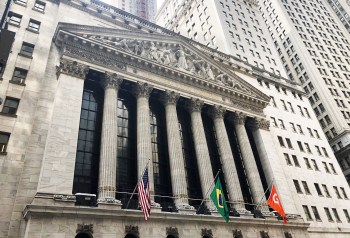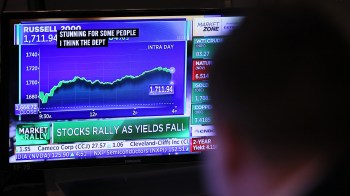TEXT OF INTERVIEW
KAI RYSSDAL: We’re going to take some time this Friday afternoon to step back and continue with Taking Stock, our occasional conversations with people who can give us the longer view of our economic situation.
As the fallout from the financial crisis contiues to spread, people are feeling a whole range of emotions — fear, anger, sadness, probably a little guilt for some of them.
Reverend Mark Bozzuti-Jones has spoken to a whole lot of people who are feeling all of those things. He works right at the heart of this economic storm, at Trinity Church on Wall Street. When we spoke, I asked him what message he’s been trying to get across to the congregation.
MARK BOZZUTI-JONES: On one level I’m reminding them, you know, that there’s bad news in the market. But what we’re about as spiritual people is to embrace the good news, that no matter how dark it gets there is a light. So, I’m somehow reminding them, you know, “OK, you have been blessed on so many levels. You have so many things. But don’t lose sight of what is more important.” And I think being generous — especially in difficult times — being loving, being patient, and being creative . . . that all these talents and all these skills and all these human traits — we can’t lose sight of those.
RYSSDAL: Those are great attributes and important. I think, though, if you ask people what they thought the main attribute of Wall Street was during this whole mess, they would probably come up with one word. And it would be greed, right?
BOZZUTI-JONES: There is a lot of greed in this country. I mean, one may say that on one level part of what makes capitalism such a viable tool is part of the greed. But I like to encourage people, you know, not to be too eager to point the finger at others and say Greed. Because, you know, on so many levels I think we’re all culpable in this market meltdown. I think, for me, I’m recognizing too that there’s been a lot of exploitation of others. Again, that’s connected to greed. But I think, on a personal level, people have given in to this desire to buy, and to possess, and to cling to things. And given in to this pleasure principle that has somehow caused all of us to lose sight of basic common sense, which is like, you know, “Don’t spend more than you have.”
RYSSDAL: So, is there a sin here, do you think?
BOZZUTI-JONES: I would like to say yes, there is a sin. There is the sin of greed. But also there is the sin — and I want to say this in the gentlest of terms — there is the sin of stupidity.
RYSSDAL: There is another thread that runs through this whole conversation, too. And that, of course, is anger.
BOZZUTI-JONES: It’s funny, you know, on Sunday I was preaching and I was telling them about Macbeth. You know, when Macbeth got angry about the loss of his wife — and again Macbeth with his greed and his own stupidity developed a life that was kind of built on tragedy. At the peak of all the tragedy, you know, Macbeth turns around and says, “Life is a tale told by an idiot, full of sound and fury, signifying nothing.” And then I said to the congregation, “But, you know, there are other ways of responding when we’re angry.” And I pointed to C.S. Lewis. When he lost his wife and he was so devastated and angry at God because he was really in love with this woman. But something within him said, “Let me sit with this anger. And let me sit and try and discover how anger can eventually lead to joy. How despair becomes joy in the end.” And he went on to write several books about how in tough times, and in difficult times humanity, if we pay attention and if we don’t allow the anger or the hate or the despair to destroy us, that we can move into what he describes as unspeakable joy.
RYSSDAL: A lot of what we’ve been talking about today, Reverend, is about materialism, and about greed, and about the desire that we have in this country to just have more things — and this is certainly the season at Christmastime where that plays out in the fullest. How do you deal with that thread in this kind of economy?
BOZZUTI-JONES: Absolutely. You know, it’s funny. I was also telling the congregation yesterday, and I said to them: “Think for a minute. Here we are. We live in New York City and most people who live in Manhattan live in very small quarters.” You know, we almost live in matchboxes, you know? And I said to them, “Think for a minute. Ninety percent of us do not need one more thing.” And so we have to find ways of rediscovering what it means to celebrate the season of light, you know, with Hannukah or, you know, the Christmas season, to find ways of being generous, being with each other. And I am certainly encouraging the congregation, you know, to give yourself. Open up your heart. Be present to someone. Be there. And I also want to remind them that, you know, what we celebrate as a Christian people when we come together around Christmas is really the celebration of a poor, humble family. A child who was helpless, born on the outskirts of society. And who through love from his parents and those around him became a human force to be reckoned with. And so much of our society today resembles that manger. We’re stripped down. We’ve lost a lot. We’re worried. We’re fearful. But, you know, all is not lost. The light will shine in the darkness. And the best is yet to come.
RYSSDAL: The Reverend Mark Bozzuti-Jones from Trinity Church on Wall Street in Manhattan. Reverend, thanks so much for your time.
BOZZUTI-JONES: Thank you. This was a pleasure.
There’s a lot happening in the world. Through it all, Marketplace is here for you.
You rely on Marketplace to break down the world’s events and tell you how it affects you in a fact-based, approachable way. We rely on your financial support to keep making that possible.
Your donation today powers the independent journalism that you rely on. For just $5/month, you can help sustain Marketplace so we can keep reporting on the things that matter to you.


















